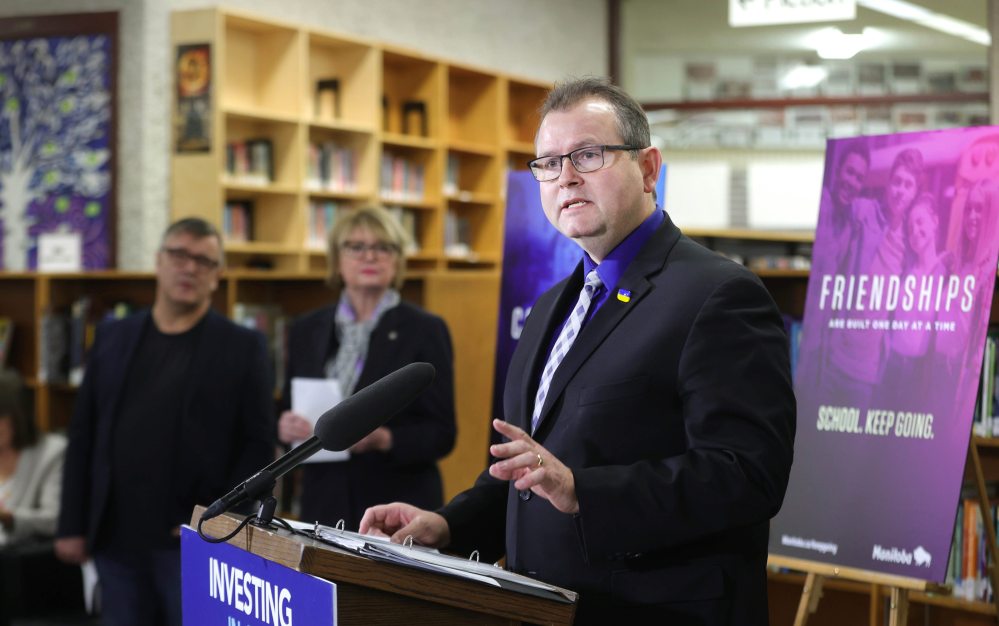Province pushes new policy, action plan to battle school absenteeism
Advertisement
Read this article for free:
or
Already have an account? Log in here »
To continue reading, please subscribe:
Monthly Digital Subscription
$0 for the first 4 weeks*
- Enjoy unlimited reading on winnipegfreepress.com
- Read the E-Edition, our digital replica newspaper
- Access News Break, our award-winning app
- Play interactive puzzles
*No charge for 4 weeks then price increases to the regular rate of $19.00 plus GST every four weeks. Offer available to new and qualified returning subscribers only. Cancel any time.
Monthly Digital Subscription
$4.75/week*
- Enjoy unlimited reading on winnipegfreepress.com
- Read the E-Edition, our digital replica newspaper
- Access News Break, our award-winning app
- Play interactive puzzles
*Billed as $19 plus GST every four weeks. Cancel any time.
To continue reading, please subscribe:
Add Free Press access to your Brandon Sun subscription for only an additional
$1 for the first 4 weeks*
*Your next subscription payment will increase by $1.00 and you will be charged $16.99 plus GST for four weeks. After four weeks, your payment will increase to $23.99 plus GST every four weeks.
Read unlimited articles for free today:
or
Already have an account? Log in here »
Hey there, time traveller!
This article was published 16/01/2023 (1058 days ago), so information in it may no longer be current.
Manitoba Education is giving school leaders until June to update their policies on chronic absenteeism in a bid to create urgency around improving student engagement and locating thousands of pupils who have become “inactive.”
On Monday, Education Minister Wayne Ewasko — flanked by members of the province’s attendance task force, which ran from 2019 to 2022 — revealed the results of a years-long study of chronic absenteeism across the province.
The province has released both a policy directive and action plan “to enhance student presence.” It is also launching a targeted public awareness campaign, made with input from students, touting the benefits of regular school attendance.

“Students who attend school regularly are more engaged in learning, have a greater sense of belonging to the community, and are more likely to obtain a high school diploma — but there is no one attendance strategy that will work for all students in all schools,” Ewasko told reporters during a news conference inside Kildonan-East Collegiate’s library.
Superintendents have received guidelines on everything from the terminology and proactive practices they should use in modern presence policies to how they should respond to chronic absenteeism and work with other stakeholders on the subject.
Expectations for monitoring, analyzing and reporting data are included in the policy directive.
The goal is to make sure schools and their partners are being more responsive and immediate in addressing non-attendance, Ewasko said.
The announcement comes 10 months after Ewasko’s office received a report it commissioned to investigate chronic absenteeism across the province and explore ways to improve it.
“Addressing Chronic Absenteeism in Manitoba: an Action Plan for Student Presence” concluded truancy has a direct negative impact on achievement, graduation, post-secondary enrolment, employment, health and the likelihood of involvement with the criminal justice and social services systems.
The 115-page document, obtained by the Free Press, found roughly 6,800 public school pupils were unaccounted for between the start of the 2019-20 and 2020-21 school years — a period during which public health officials declared the COVID-19 pandemic.
Enrolment in the Winnipeg School Division, the province’s most populous district, dropped by 3,148 over that year. Some transferred or started homeschooling; others disengaged from academics.
“For many of our students, the regular school day — 9 a.m. to 3:30 p.m., the regular terms, the regular expectations — it’s not one-size-fits all,” said Pauline Clarke, chief superintendent of WSD, during the news conference Monday.
Clarke, who sat on the province’s attendance task force, said the province’s renewed emphasis on student presence recognizes that reality and the need for alternative education options, such as offering flexible schooling hours.
The Vancouver-based consulting group that studied absenteeism in Manitoba called on local officials to update policy and practices to require an immediate and personalized response when a student has an unexcused absence and implement co-ordinated case management.
The report’s recommendations have garnered mixed reviews, but task force members are in agreement an emphasis on co-ordination between stakeholders, including various government departments, is critical.

Kent Dueck said chronic absenteeism must be examined as a deep-rooted issue that requires cooperation between safe and welcoming schools, government departments, and community organizations.
The executive director of Inner City Youth Alive, a faith-based resource centre that runs drop-in programs for students in Winnipeg’s North End neighbourhood, called the new directive a milestone moment because the complexity of this issue is being acknowledged.
“For many years, the issue of absenteeism was kind of like an open secret. Through our inaction, I suppose, as a society, we tacitly came to accept that some children would not get an education,” Dueck said.
While noting the province is touting regular attendance, the education minister noted students who are symptomatic are still encouraged to stay home until they are feeling better.
“What we are saying is: ‘If you are sick, stay home — but then, there is going to be an immediate reaction by the school or the school community’” (to find out why a student is absent), Ewasko said.
“And if it continues to go over a few days, we’re going to have those case managers (at the ready).”
— with files from Carol Sanders
maggie.macintosh@freepress.mb.ca
Twitter: @macintoshmaggie

Maggie Macintosh
Education reporter
Maggie Macintosh reports on education for the Free Press. Originally from Hamilton, Ont., she first reported for the Free Press in 2017. Read more about Maggie.
Funding for the Free Press education reporter comes from the Government of Canada through the Local Journalism Initiative.
Every piece of reporting Maggie produces is reviewed by an editing team before it is posted online or published in print — part of the Free Press‘s tradition, since 1872, of producing reliable independent journalism. Read more about Free Press’s history and mandate, and learn how our newsroom operates.
Our newsroom depends on a growing audience of readers to power our journalism. If you are not a paid reader, please consider becoming a subscriber.
Our newsroom depends on its audience of readers to power our journalism. Thank you for your support.
History
Updated on Monday, January 16, 2023 3:55 PM CST: Fixes typo
Updated on Monday, January 16, 2023 8:19 PM CST: Full write-thru with additional info, quotes
Updated on Monday, January 16, 2023 8:50 PM CST: Adds new photos





